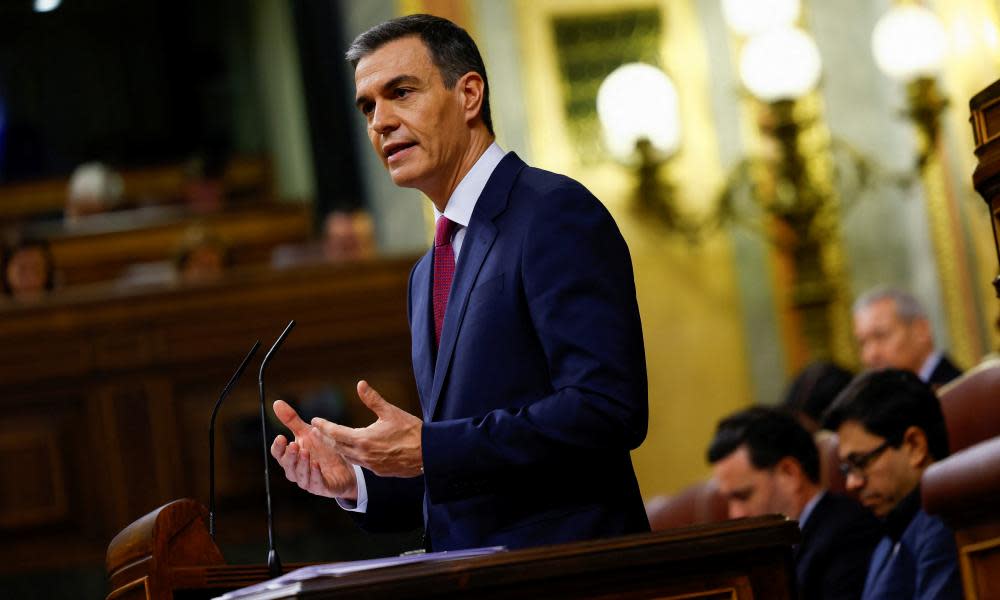What is the Catalan amnesty deal agreed by Pedro Sánchez?

Pedro Sánchez, the leader of the Spanish Socialist Workers party (PSOE), is all but certain to secure a second term as prime minister during an investiture vote in congress on Thursday.
His return to office comes almost four months after July’s inconclusive general election and has hinged on the creation of a controversial Catalan amnesty law that has angered many people in Spain – not least rightwing parties and judges.
What happened in the general election?
Sánchez, a leader known for taking risks, called the snap election after the PSOE and its coalition allies suffered a punishing defeat in May’s regional and municipal elections. The gamble paid off: although it finished second behind the conservative People’s party (PP), the PSOE far exceeded expectations.
Despite its victory, the PP fell short of a parliamentary majority and could not muster the necessary backing to form a government, even with the support of the far-right Vox party and other, smaller groupings. That failure gave the PSOE and its partners in the leftwing Sumar alliance an opportunity to have a go at putting together a new administration.
What happened then?
It soon became apparent that a PSOE-Sumar government would need the congressional support of smaller regional parties, including the two main Catalan pro-independence parties, the pragmatic Catalan Republican Left (ERC) and the hardline Junts per Catalunya (Together for Catalonia). The ERC and Junts made it clear that they would back a new Sánchez government only in return for an amnesty for hundreds of people who have faced legal action over their role in the unilateral, illegal push for regional Catalan independence six years ago. They include Carles Puigdemont, the former Catalan regional president who leads Junts and who masterminded the 2017 attempt to secede before fleeing Spain to avoid arrest.
Why was that a big deal?
The events of October 2017 plunged Spain into its worst political and territorial crisis in decades, leading the PP government of the time to send police to Catalonia to stop people voting in the independence referendum. The central government then sacked Puigdemont and his administration and took direct control of the region. While Puigdemont went into self-exile in Belgium, some senior independence activists, including members of his cabinet, were arrested, tried and jailed. Hundreds of others were fined or charged. Puigdemont has become a hate figure for many Spaniards who feel that his pursuit of Catalan independence threatened Spanish unity and that he should be returned to Spain to face justice. According to a recent poll, 70% of Spaniards are opposed to the amnesty.
If that’s the case, why is it happening?
Because Sánchez needs the support of the ERC and Junts to stay in government, and is confident that the controversy will fade and that the measure will help promote coexistence. He was fiercely criticised by his rightwing opponents two years ago when he pardoned nine Catalan leaders for their roles in the independence effort, but he maintained the gesture was needed to help reduce tensions.
What does the amnesty cover and to whom does it apply?
The draft bill, tabled by the PSOE on Monday, is titled the organic amnesty law for institutional, political and social normalisation in Catalonia. According to the Sánchez camp, it is intended to live up to its name. It covers the period from 1 January 2012 to 13 November 2023, so its scope includes the symbolic, consultative and unilateral independence referendum of November 2014 and the one that came three years later and was followed by a unilateral declaration of regional independence.
Its beneficiaries include 309 people who face criminal lawsuits and 73 police officers who face criminal action over their conduct on the days before and after the second referendum. It will also apply to two cases of alleged terrorism involving the pro-Catalan independence direct action groups the Committees for the Defence of the Republic, which blocked roads and rail lines, and the Tsunami Democràtic platform, which occupied Barcelona airport in October 2019.
Apart from the two cases mentioned above, the amnesty will exclude anyone found to have carried out terrorism, torture or “wilful actions” that have resulted in death or serious injury.
Although the amnesty will allow Puigdemont to return to Spain and some of his former colleagues to have their ban on holding public office lifted, the socialists are keen to emphasise that the act of clemency is more general. They say it is designed to apply to the headteachers who have faced legal action for allowing their schools to be used as referendum polling stations, and to civil servants, firefighters and police officers.
What happens next?
The draft amnesty law, which can be amended as it passes through parliament, is expected to be approved by congress, where Sánchez and his allies have a majority. But the PP – which has attacked the legislation as an assault on the rule of law and urged the EU to weigh in on the matter – controls the senate, meaning it could delay the law’s passage. The legislation has also been criticised by conservative judges.
Once the law is approved, it will be applied by judges on a case by case basis, meaning the controversy is likely to roll on.


